|
In the heart of Paul's letter to the Ephesians lies a verse that encapsulates the transformative power of Christian conduct: "Be kind to one another, tenderhearted, forgiving one another, as God in Christ forgave you." Ephesians 4:32 is not merely a suggestion; it is a call to embody the grace we have received through Christ in our daily interactions with others.
Kindness is a simple word, yet it holds profound implications for how we live our lives. It is an active choice, a deliberate action that we take to improve someone else's day, to lighten their burden, or to simply acknowledge their humanity. It is a quality that does not depend on the worthiness of its recipient but is given freely and generously, just as God has done for us. Being tenderhearted goes beyond superficial niceties. It requires us to be vulnerable, to allow ourselves to feel empathy and compassion for others. It is in this softness of heart that we find the strength to connect with others on a deeper level, to see beyond our differences, and to recognize the shared human experience that binds us all. Forgiveness is perhaps the most challenging aspect of this verse. To forgive as Christ forgave us means to let go of grudges and bitterness, to release the desire for retribution, and to make peace with the past. Forgiveness does not condone wrongdoing, but it frees us from the toxic cycle of anger and resentment. It is a gift we give to ourselves as much as to the one who wronged us. Living out Ephesians 4:32 is a daily practice, a conscious decision to reflect God's love in our words and actions. It means choosing kindness when we are tempted to be harsh, offering a gentle word when we could be critical, and extending forgiveness when we would rather hold onto our hurt. It is a commitment to being agents of God's grace in a world that often seems devoid of it. As we strive to be kind, tenderhearted, and forgiving, we become beacons of light in the lives of those around us. We contribute to a culture of grace that can heal divisions and build bridges of understanding. Our actions, inspired by the love we have received, can have a ripple effect, encouraging others to also live out these values. In a world that can be harsh and unforgiving, Ephesians 4:32 offers a different way—a way of gentleness, compassion, and grace. It challenges us to rise above our instincts for self-preservation and retaliation, to become vessels of the same unconditional love that we have been shown through Christ. As we reflect on this powerful verse, let us commit to putting it into practice, not just in grand gestures, but in the small, everyday moments that make up the fabric of our lives. Let us be kind to one another, tenderhearted, forgiving one another, just as God in Christ forgave us. For in doing so, we not only honor God, but we also create a little more heaven on earth. Closing Quote: "Let kindness be the melody of your heart, tenderheartedness the harmony of your soul, and forgiveness the chorus that echoes the grace of Christ within you." Until next time, stay blessed, stay positive, and keep being a shining light for God!
0 Comments
In the tapestry of scripture, Hebrews 11:1 is a golden thread, a verse that captures the essence of faith with poetic clarity: “Now faith is being sure of what we hope for and certain of what we do not see.” This profound statement is not just a definition; it's an invitation to a life of trust and conviction in the promises of God, even when they are beyond our physical sight.
Faith, according to this verse, is the 'substance'—a term that suggests tangibility and assurance. It's as if faith gives weight to our hopes, making them as real as the ground beneath our feet. It's the foundation upon which our spiritual journey is built, the bedrock of our relationship with the Divine. When we hope for something, faith transforms that hope from a mere wish into something we can almost touch, a reality that we start to live in even before it manifests. The second part of the verse speaks of 'evidence'—a concept that resonates with proof and conviction. Faith acts as the evidence of the unseen, the unseen blessings, the unseen workings of God, and the unseen future that He has prepared for us. It's the assurance that even though we cannot see God, His angels, or the wind of the Holy Spirit, they are as real as the air we breathe. Faith is the lens through which we perceive the spiritual realm, bringing into focus the reality of God's kingdom. Hebrews 11:1 is not just a passive observation; it's a call to action. It challenges us to live by faith, to make decisions based on the confidence we have in God's word, and to hold onto hope even when circumstances seem to suggest otherwise. It's a reminder that our faith is not based on the visible and the temporal, but on the eternal and the unchanging promises of God. This verse is the prelude to the 'Hall of Faith'—a roll call of biblical figures who exemplified living by faith. From Abel to Enoch, from Noah to Abraham, these individuals did not have the full picture of God's plan, yet they trusted and obeyed. They remind us that faith is not about having all the answers but about being willing to follow the One who does. In our own lives, Hebrews 11:1 encourages us to look beyond what we can see with our eyes. It beckons us to trust in God's plan for our lives, to believe for healing, provision, and salvation, even when they seem distant. It's a verse that empowers us to be bold in our prayers and steadfast in our walk with God, knowing that what we hope for in Him will come to pass. As we reflect on Hebrews 11:1, let us embrace the substance and evidence of faith in our daily lives. Let us hold fast to the conviction that our hopes, anchored in Christ, are not in vain. And let us walk in the assurance that, though we may not see the full picture now, we are part of a grander story that is being woven by the hands of an all-knowing, all-loving God. In conclusion, faith as described in Hebrews 11:1 is not a fleeting emotion or a momentary belief; it is the enduring confidence in what we hope for and the unwavering trust in what we cannot see. It is the heartbeat of our spiritual existence, the rhythm that sustains us through trials and tribulations. Faith is the assurance that, no matter what we face, we are never alone, for our God is with us, and His promises are true. Closing Quote: "Embrace faith as your spiritual compass, for it guides you through the unseen, anchoring your soul in the hope of God's unfailing promises." Until next time, stay blessed, stay positive, and keep being a shining light for God! As the soft hues of dawn break across the sky, heralding the arrival of Easter, our hearts are filled with an indescribable peace and happiness. This sacred time of year is not just a moment in the liturgical calendar; it is a profound experience that resonates deep within our souls. Easter is a celebration of life, of victory, and of an enduring hope that stems from the resurrection of Jesus Christ.
The story of Easter is one of ultimate sacrifice and divine love. It is about Jesus, who bore the weight of our sins and faced the agony of the cross, so that we might be freed from the chains of sin and death. His resurrection on the third day is the cornerstone of our faith, a testament to the power of God's love and the fulfillment of His promise of salvation. But what does Jesus truly mean to us? He is the embodiment of peace that calms our troubled hearts in times of distress. He is the source of joy that uplifts our spirits when the world seems bleak. In Him, we find a friend who understands our struggles, a teacher who imparts wisdom, and a savior who offers us the gift of eternal life. The peace and happiness we find in Easter are not fleeting emotions; they are the essence of our relationship with Christ. They are the assurance that no matter what trials we face, we are never alone. Jesus' resurrection is a reminder that life triumphs over death, love conquers hate, and light dispels darkness. As we celebrate Easter, let us reflect on the incredible peace that Jesus brings into our lives. It is a peace that surpasses all understanding, one that guards our hearts and minds (Philippians 4:7). This peace is not dependent on external circumstances; it is rooted in the knowledge that we are loved, forgiven, and redeemed. The happiness of Easter is also a deep and abiding joy. It is a joy that springs from the knowledge that we are part of a larger story, one that began with God's creation and will culminate in His glorious kingdom. It is a joy that is made complete in our communion with Christ and with one another as members of His body, the Church. As we write our own chapters in this grand narrative, let us embrace the lessons of Easter. Let us be agents of peace in a world that yearns for tranquility. Let us spread the joy of the gospel through our words and actions. And let us live each day with the confidence that comes from knowing we are part of something eternal and divine. Easter is also a time for renewal and growth. As the earth awakens from its winter slumber and bursts forth with new life, so too are we invited to grow in our faith and in our love for Jesus. Let us take this opportunity to deepen our spiritual practices, to reach out in service to others, and to cultivate the fruits of the Spirit in our lives. In the quiet moments of Easter morning, as we sit in contemplation or gather with loved ones, let us remember the incredible peace and happiness that Jesus offers. Let us hold fast to the promise of resurrection and the assurance that in Him, we have everything we need. As we conclude, let us carry the message of Easter with us throughout the year. Let us be beacons of hope in a world that desperately needs the light of Christ. And let us always remember that in Jesus, we find the true meaning of peace, happiness, and love. May this Easter season be a time of reflection, celebration, and transformation for each of us. May we experience the serenity that comes from knowing Jesus, and may our lives be a testament to the power of His resurrection. Happy Easter to all and may the peace of Christ be with you now and always. Forty Days of Faithfulness: A Lenten Journey of Reflection and Renewal - Day 40: The Resurrection3/30/2024 As we arrive at Day 40 of our 40-day Lenten devotional, our hearts are filled with a sense of completion, joy, and profound gratitude. Today, March 30th, we stand in the light of the greatest event in Christian faith—the Resurrection. Our theme, "Resurrection," is not just a concept; it is the cornerstone of our belief, the Victory of Easter, and the fulfillment of God's promise to us all.
The scripture that guides us today is Matthew 28:5-6, which recounts the angel's message to the women at the tomb: "Do not be afraid, for I know that you are looking for Jesus, who was crucified. He is not here; he has risen, just as he said. Come and see the place where he lay." These words are not just a historical account; they are a proclamation of victory over death and sin, a testament to the power of God's love. As we reflect on this passage, we are reminded that the Resurrection is not merely an event that happened two thousand years ago; it is a reality that continues to unfold in our lives today. The risen Christ is a symbol of hope, a beacon of new beginnings, and the assurance of eternal life. It is through Him that we find the strength to overcome our trials, the courage to face our fears, and the confidence to step into the future with faith. Our prayer focus for today is a celebration of the risen Christ and the hope of eternal life. We rejoice in the knowledge that Jesus conquered the grave, offering us a path to salvation and a relationship with God that is everlasting. As we conclude our Lenten journey, let us carry the joy of the Resurrection in our hearts, sharing the good news with those around us and living as witnesses to Christ's enduring love. The Victory of Easter is not just a day of celebration; it is a call to action. It challenges us to live out the implications of the Resurrection in our daily lives—to be agents of change, carriers of peace, and ambassadors of love. As new creations in Christ, we are called to embody the spirit of the Resurrection, to bring light to the dark places of the world, and to offer hope to those in need. As we meditate on the significance of the Resurrection, let us also take a moment to reflect on our own personal journeys throughout these 40 days. What has changed within us? How have we grown in our faith? And how will we continue to live out the lessons we've learned and the grace we've received? In closing, I extend my heartfelt thanks to each of you for walking this path with me. Your presence, your prayers, and your reflections have been a source of encouragement and inspiration. As we celebrate the risen Christ today, let us hold fast to the promise of new life and the assurance that, in Him, we are forever transformed. May the joy of the Resurrection fill your hearts and may the peace of Christ reign in your lives now and always. Closing Prayer: Heavenly Father, as we conclude our 40-day Lenten journey, we come before You with hearts overflowing with joy for the gift of Your Son, Jesus Christ. We celebrate His resurrection, the triumph over the grave, and the hope of eternal life it brings to us. May we carry the light of this victory into every corner of our lives, sharing the love and redemption You have so graciously offered. In Jesus' name, we pray, Amen. As we stand on the precipice of Day 39 in our 40-day Lenten devotional, we find ourselves enveloped in the profound theme of "The Promise of New Life." Today, March 29th, we are called to reflect deeply on the transformative power of our faith in Jesus Christ, as articulated in 2 Corinthians 5:17: "Therefore, if anyone is in Christ, the new creation has come: The old has gone, the new is here!"
This scripture is not merely a verse; it is a declaration of the metamorphosis that occurs within us when we embrace faith. It speaks of shedding the worn-out layers of our past and stepping into a life rejuvenated by the Spirit. As we journey through Lent, we are reminded of the sacrifices made, the introspection undertaken, and the spiritual growth that has been cultivated. Now, we stand on the cusp of Easter, ready to emerge as new creations. The imagery of new life is particularly poignant as we witness the natural world around us awakening from its winter slumber. Buds are beginning to bloom, and creatures are stirring from their rest, all symbols of the resurrection that we, too, can experience in our spiritual lives. Just as the caterpillar transforms into a butterfly, so too are we invited to spread our wings and soar to new heights in our faith. But what does it mean to live as people of the resurrection in the present world? It means to carry within us the light of Christ, illuminating the darkness that we may encounter. It means to live with a heart of forgiveness, just as we have been forgiven. It means to extend love and grace to others, recognizing the divine spark within each person we meet. Living as a new creation also challenges us to view our daily lives through the lens of eternity. Our actions, our words, and our thoughts are all opportunities to manifest the love of Christ. We are called to be ambassadors of hope, agents of change, and bearers of joy. In a world that often seems rife with despair, we are the harbingers of the Good News, the testament that life triumphs over death, love conquers hate, and light dispels the shadows. As we reflect on this theme, let us consider the areas of our lives that are yearning for renewal. Perhaps there are relationships that need mending, dreams that need reviving, or callings that need answering. Let us approach these with the confidence that comes from being a new creation, knowing that we are equipped and empowered by the Holy Spirit to bring forth positive change. Moreover, let us examine how we can live out our resurrection identity in tangible ways. Can we volunteer our time to help those in need? Can we offer a listening ear to a friend in distress? Can we use our resources to support causes that align with our Christian values? The possibilities are endless, and each act of kindness is a ripple that extends the love of Christ into the world. As we prepare for the final day of our devotional, let us carry with us the lessons learned and the growth experienced. Let us not forget the journey that has brought us to this point, nor the destination that lies ahead. Easter is not just a day; it is a state of being a continuous celebration of the life that has been granted to us through the resurrection of Jesus. In closing, I invite you to take a moment of silence to meditate on the promise of new life. Envision yourself stepping out of the old and into the new, fully embracing your identity as a child of God. May this vision guide you not only through the remainder of Lent but also through each day that follows. May the promise of new life fill you with hope, joy, and peace as we look forward to the glory of Easter. Closing Prayer: Gracious Lord, as we reflect on Day 39 of our Lenten walk, we ask for Your guidance in embracing the transformative power of Your love. Help us to shed the old and step into the new life You have promised that we may live out the reality of the resurrection with every breath we take. In Your holy name, we pray, Amen. Forty Days of Faithfulness: A Lenten Journey of Reflection and Renewal - Day 38: The Burial3/28/2024 As we enter Day 38 of our Lenten journey, we find ourselves contemplating the profound theme of waiting and hope amidst loss. In the quiet aftermath of Jesus' crucifixion, His followers are enveloped in grief as they lay His body to rest. John 19:38-42 paints a somber picture: Joseph of Arimathea, a secret disciple of Jesus, courageously approaches Pilate to request His body. Together with Nicodemus, they tenderly prepare Jesus for burial, wrapping Him in linen with spices, according to Jewish burial customs. In the silence of the tomb, there is a palpable sense of waiting—a sacred pause filled with the promise of hope.
Personal Reflection The shadow of death has touched my life in profound ways, casting a shadow over my youthful days with the sudden passing of three people in my life during my high school years, each loss striking near Easter for three years in a row. In my twenties, the world seemed to shudder again when a dear friend was taken by a violent crime. Yet, the most heart-wrenching experience has been witnessing my mother's valiant struggle against lung cancer, a battle that took her vibrancy bit by bit. Despite the omnipresence of death, my Christian faith assures me it's not the final chapter. There's a promise of something beyond our wildest dreams, a splendor awaiting us that brings solace to my soul. Steadfast in Sorrow: Reflecting on Christ's Burial and the Promise of Resurrection John 19:38-42 offers us a window into the souls of those closest to Jesus as they confront the stark reality of His interment. Joseph of Arimathea steps out from the periphery of discipleship, courageously claiming the Savior's body. His petition to Pilate is a bold move, signifying his deep commitment to Jesus, despite the potential threat to his own reputation and well-being. Nicodemus, once a seeker in the secrecy of night, now joins Joseph in broad daylight, bringing spices to anoint the body of Jesus. Their actions, steeped in Jewish tradition, honor the deceased with utmost respect and solemnity. This act is a powerful homage to the influence Jesus had on them; their loyalty remains unshaken even as they face His demise. The dignified burial they provide is a silent yet potent expression of belief and anticipation. Joseph and Nicodemus set the stage not only for Jesus' physical preparation but also for the unfolding of the resurrection miracle. Their steadfastness in this somber time heralds the hope that will emerge, a reminder that even in the deepest gloom, there exists a light that death cannot dim. Hope in the Quiet: Finding Serenity Amidst Grief In the hushed moments after Jesus' burial, His followers find themselves in a deep calm, burdened by the heavy fog of uncertainty. The tomb's finality mirrors the quiet of their unresolved queries and the depth of their expectant sorrow. They have journeyed with Jesus, beheld His wonders, and embraced His assurances—yet now they stand in the penumbra of His passing, their future veiled and their hope on trial. This hallowed interlude in the story beckons us to reflect on our own encounters with loss. Confronted with the unknown, the departure of dear ones, or the fading of aspirations, we too are summoned to abide. But our waiting is active; it is a period to recall the promises bestowed upon us. As the disciples clung to Jesus' prophecy of His return, we too hold tight to our faith's guarantees—that each conclusion heralds a fresh start, and with every dusk, a new daybreak is assured. In these intervals of anticipation, we discover that hope transcends emotion; it is the decision to have faith in what is not seen, to trust in the transformative power that turns grief into celebration. It is the tranquility that stems from an inner certainty that love prevails over death, and that in Christ, every farewell is not a finality, but a vista of everlasting life. As today's contemplation gently concludes, we ponder the silence that envelops the world, a stillness that resonates with the faithful. In this period of expectancy, we are reminded that hope does not fade in the face of loss. Jesus' entombment, while a time of intense mourning, also acts as the overture to the ultimate victory over death. Let us cling to the vision of what lies ahead, finding tranquility in the knowledge that the narrative does not cease at the grave. May this hope accompany us, guiding us through our own epochs of waiting and bereavement, until the light of resurrection dawns. Closing Prayer: Heavenly Father, just as Joseph of Arimathea and Nicodemus found courage to honor Your Son, grant us the strength to face our losses with hope. In our moments of grief, remind us of the resurrection promise, that in You, every end is a new beginning. Comfort us with the knowledge that our loved ones rest in Your eternal peace. May our hearts be steadfast, awaiting the joy of Your salvation. Amen. As we approach the final days of our 40-day Lenten devotional, we find ourselves on Day 37, standing before the sealed tomb of Jesus. Today, we will examine the burial of Jesus and the sealed tomb as described in Matthew 27:57-66 and focus on the themes of waiting and hope in the midst of darkness.
The burial of Jesus was a moment of profound sorrow and darkness for His followers. Joseph of Arimathea, having received Pilate's permission, took Jesus' body down from the cross, wrapped it in a clean linen shroud, and laid it in his own new tomb, which he had cut in the rock. He then rolled a great stone to the door of the tomb and departed. The following day, the chief priests and Pharisees gathered before Pilate, expressing their concern that Jesus' disciples might steal the body and claim He had risen from the dead. Pilate agreed to their request for a guard and ordered the tomb to be made secure by sealing the stone and setting a watch. In the darkness of the tomb, there is a profound sense of waiting. It is a waiting filled with uncertainty, grief, and the palpable weight of finality. Yet, for us as believers, this waiting is also imbued with hope. The sealed tomb becomes a symbol not just of death, but of the anticipation of resurrection. It is in this space of waiting that our faith is often tested, and our hope is called to shine the brightest. The sealed tomb also represents the times in our lives when we face our own periods of darkness and waiting. We all experience moments when our hopes and dreams seem to be buried, when the weight of our circumstances feels as immovable as the stone sealing Jesus' tomb. It is in these times that the story of the tomb calls us to remember that darkness is not the end. The same God who raised Jesus from the dead is present with us in our waiting, whispering promises of new life and resurrection. As we reflect on the sealed tomb, let us consider the ways in which we are called to wait with hope. How can we embody a spirit of expectancy, even when the dawn seems far off? How can we support one another in times of darkness, offering the light of hope to those who struggle to see it? Let us also remember that the tomb was not the end of the story. The darkness of the tomb was a prelude to the glory of the resurrection. As we wait in our own lives, may we hold fast to the hope that our stories, too, have not reached their conclusion. The same power that rolled away the stone and revealed the empty tomb is at work in our lives, bringing light to our darkness and turning our mourning into dancing. In our prayer today, let us ask for the grace to wait with hope. May we be strengthened by the knowledge that, even in the darkest of tombs, God's love is at work, preparing the way for resurrection and new life. Closing Prayer: Heavenly Father, in the stillness of the sealed tomb, teach us to wait with hope. Help us to trust in Your promises, even when we cannot see the path ahead. As we reflect on the burial of Your Son, fill our hearts with the assurance that darkness is never the end of the story. May we rest in the knowledge that You are always at work, bringing life from death and light from darkness. In Jesus' name, we pray. Amen. Forty Days of Faithfulness: A Lenten Journey of Reflection and Renewal - Day 36: Joseph of Arimathea3/26/2024 As we continue our 40-day Lenten journey, we arrive at Day 36, a day to reflect on the quiet yet courageous actions of Joseph of Arimathea. This respected member of the council, who had not consented to the decision and action of the others, displayed a remarkable act of bravery and respect as he requested the body of Jesus from Pilate (Mark 15:42-46). Today, we dive into the theme of respect and dignity in death, as exemplified by Joseph's actions.
Joseph of Arimathea, a secret disciple of Jesus, emerges in the Gospel of Mark as an unexpected figure of compassion and courage. In the face of potential ridicule and persecution, Joseph steps forward to ensure that Jesus is given a proper burial. His request to Pilate is not only a request for the body of a man he revered but also a statement of his faith and a demonstration of his respect for the sanctity of life, even in death. The courage of Joseph is a poignant reminder of the importance of standing up for what is right, even when it is not the popular or easy choice. His actions teach us that respect and dignity are not reserved for the living alone but extend to how we honor those who have passed. In a world where death is often sanitized or hidden away, Joseph's example calls us to acknowledge the sacredness of life's final transition. Let us consider how we can embody the spirit of Joseph in our own lives. How do we treat the memory and legacy of those who have gone before us? Do we show the same respect and dignity to all individuals, regardless of their status in life or in death? Joseph's actions challenge us to look beyond our fears and prejudices and to act with compassion and bravery. In our reflection today, let us also ponder the significance of burial rites and the rituals that surround death in our various cultures and traditions. These practices serve not only as a means to honor the deceased but also as a way for the living to process grief and begin the journey of healing. Joseph's act of securing a tomb for Jesus is a profound act of love and respect, one that underscores the importance of these final rites. As we move closer to the end of Lent, let us pray for the courage to act with dignity and respect in all aspects of life, including in the face of death. May we have the strength to honor the lives of those around us and those who have departed, just as Joseph of Arimathea honored Jesus. As we reflect on the themes of today, may we carry the lessons of Joseph of Arimathea with us, allowing them to shape our actions and interactions with those around us. Let us be inspired by his example to live a life of courage, respect, and dignity, in honor of the One who gave His life for us all. Closing Prayer: Gracious God, we remember the courage and respect of Joseph of Arimathea. Grant us the bravery to stand up for what is right, to honor the dignity of every soul, and to cherish the sanctity of life until its natural end. Help us to be compassionate in our actions and to remember the importance of rituals that bring comfort and closure. May we walk in the footsteps of Joseph, carrying forward the legacy of respect and dignity for all. Amen. In a society that often places a premium on external appearances, Proverbs 31:30 offers a refreshing and countercultural perspective: "Charm is deceptive, and beauty is fleeting; but a woman who fears the Lord is to be praised." This verse is a beacon of truth, guiding us to understand the impermanence of physical allure and the enduring value of spiritual reverence.
The Proverbs 31 woman is an archetype of virtue and strength, celebrated not for her temporal attributes but for her enduring fear of the Lord. The term "fear" in this context is not about being afraid but rather about having a profound respect and awe for the Creator. It is this deep-seated reverence that shapes her character and actions, making her worthy of praise and admiration. Charm and beauty, while not inherently negative, are described as deceptive and fleeting to highlight their transient nature. They can be alluring, but they do not last. The wisdom of Proverbs 31:30 encourages us to look beyond the surface and to value the qualities that withstand the test of time. A woman who fears the Lord exhibits qualities such as kindness, wisdom, and integrity. These traits emanate from her faith and are reflected in her interactions with others. She is a nurturer, a provider, a counselor, and a role model. Her worth is not measured by the standards of the world but by the impact of her faith-filled life on those around her. The verse also speaks to the broader theme of inner beauty. It challenges both men and women to cultivate a heart that honors God, knowing that this is the source of true beauty. It is a call to prioritize the development of our spiritual lives, understanding that our relationship with the Lord is what truly defines us. In a culture that often equates value with physical attractiveness, Proverbs 31:30 stands as a timeless reminder of the greater worth found in godliness. It is a call to recognize and celebrate the beauty of a life lived in devotion to God—a beauty that does not diminish with age but grows more radiant with the passing of time. As we reflect on this verse, let us strive to embody the qualities that are truly praiseworthy. Let us nurture our relationship with the Lord, allowing it to shape us into individuals of substance and depth. And let us remember that while the world may focus on the external, it is the internal—the heart that fears the Lord—that is truly deserving of honor and praise. Until next time, stay blessed, stay positive, and keep being a shining light for God! As we enter the final stretch of our 40-day Lenten devotional, we find ourselves reflecting on a moment of profound revelation and unexpected faith. Today, we contemplate the centurion's recognition of Jesus as the Son of God, as recounted in Matthew 27:54. This Roman officer, a symbol of power and authority, stood at the foot of the cross and witnessed something that transformed his understanding and belief.
The centurion had likely seen many crucifixions, but this one was different. The earth shook, the skies darkened, and amidst the chaos, he saw the unwavering compassion and forgiveness that Jesus displayed. It was in this moment of divine intersection that the centurion proclaimed, "Truly, this was the Son of God." Let's explore the theme of revelation and belief in unexpected places. The centurion's confession is a powerful testament to the truth that faith can arise in the most unlikely of hearts. It reminds us that God's presence and the recognition of His divinity are not confined to the walls of temples or the pages of scripture but can manifest anywhere, even in the midst of suffering and despair. The centurion's experience challenges us to consider our own moments of revelation. Have there been times when we, too, have encountered the divine in places we least expected? Perhaps it was in the kindness of a stranger, the beauty of nature, or the quiet moments of introspection. These instances of sudden clarity can be transformative, reshaping our beliefs and strengthening our faith. As we meditate on the centurion's confession, we are also invited to reflect on the nature of belief itself. Belief can be a journey filled with questions, doubts, and, ultimately, moments of clarity. It is not always the product of a gradual enlightenment but can be sparked by a single, impactful event. The centurion's declaration was not the result of a lifelong pursuit of religious truth but a sudden, undeniable recognition of Jesus' divinity. This story also encourages us to look for the divine in those around us and to remain open to the possibility that anyone can bear witness to the truth. The centurion, a representative of the oppressive Roman Empire, was moved to faith by what he saw at the cross. His confession serves as a reminder that the message of Jesus transcends cultural, political, and social barriers, reaching into the hearts of all who are open to receive it. Moreover, the centurion's acknowledgment of Jesus' identity as the Son of God amidst a scene of apparent defeat and death speaks volumes about the paradoxical nature of the Kingdom of God. It is often in the moments of greatest weakness that God's power is most profoundly revealed. The cross, a symbol of shame and defeat, became the ultimate expression of love and victory. As we reflect on the centurion's confession, let us also consider our own declarations of faith. How do we express our recognition of Jesus' lordship in our lives? Do we, like the centurion, have the courage to proclaim our faith in the face of opposition or misunderstanding? In closing, let us pray for the grace to recognize the presence of God in unexpected places and people. May we be open to the revelations that come to us in our daily lives, and may our hearts be transformed by the truth of who Jesus is. Just as the centurion's confession was a moment of awakening, may we too experience moments that affirm and deepen our faith. As we journey through these final days of Lent, let us hold onto the hope and assurance that belief can emerge in the most surprising of circumstances, and that the truth of Jesus' identity as the Son of God continues to reveal itself in our world today. May your reflections on this day bring you closer to the heart of God and may the centurion's confession inspire you to look for and acknowledge the divine fingerprints in your own life. Closing Prayer: Heavenly Father, as we reflect on the centurion's profound declaration of faith, we ask for the grace to recognize Your divine presence in our lives. Open our eyes to see You in unexpected places and our hearts to the revelations You bestow upon us. May we, like the centurion, proclaim with certainty that Jesus is Your Son, embracing the truth of Your love and mercy. Guide us in our remaining days of Lent, that we may grow ever closer to You. In Jesus' name, we pray. Amen. |
What
|

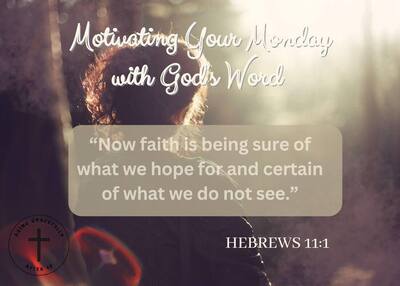
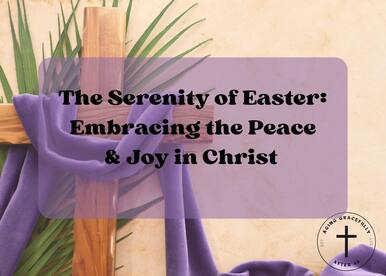
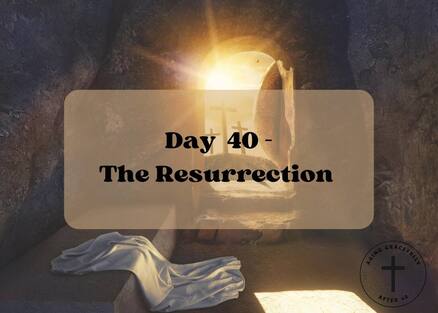


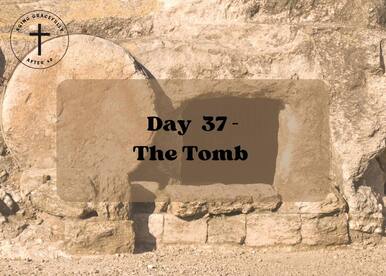
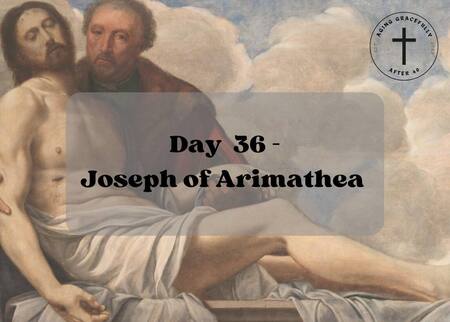

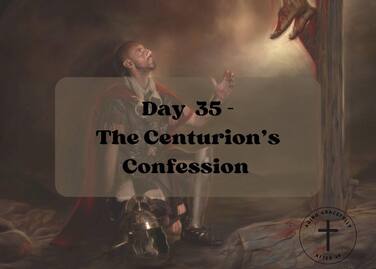
 RSS Feed
RSS Feed
